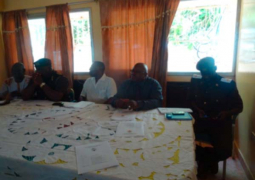
Gender inequalities substantially limit women’s access to control over and use of services and productive resources. As a result, natural hazards have different impact on men and women.
These inequalities make the effect more devastating for women. With equal gender opportunities, a new environmentally-friendly perspective needs to be developed that makes men and women equally accountable for their personal consumption and renders them responsible for the impact they have on the environment.
Urgent actions are needed to combat climate change, but lack of information on gender and climate change has slowed our reactions.
Today, there is inadequate information on gender issues relating to climate change. Further research is, therefore, needed in several aspects to establish the linkages between gender and climate change.
One important challenge to mainstreaming gender in climate change activities is the small proportion of women in relevant professions and positions of authority.
The international climate change process will be unable to achieve true global legitimacy or relevance until it adopts the principles of gender at all stages of the process, from research, through analysis, agenda formation, negotiation and decision making, regime implementation and finally in further development and evaluation.
The issue is not just that women should participate in a quantitative sense, but of more importance is the effectiveness and efficacy of their participation, and that their voices are heard while their views are integrated into a strategy more acceptable and equitable to all.
Currently, there is low institutional capacity to address these important linkages. Many organisations need institution strengthening in gender sensitisation, gender analysis and gender budgeting.
The capacity of the institutions must be built to effectively mainstream gender issues into policy formation and programme development.
Inadequate gender-specific data is another major constraint. More gender disaggregated research is required in order to shed more light on levels of vulnerability and coping mechanisms of different social groups.
The findings of such research should then feed into the climate negotiating process to enable decision-makers have a better understanding of how different people are affected, and what kind of capacity and support is needed to facilitate mainstreaming of gender into national polices, action plans.
On strategies for gender and climate change advocacy
The first action to be taken in gender mainstreaming for policy formation and advocacy is to identify relevant stakeholders in different sectors, determine the knowledge gaps, as well as their sphere of influence and areas of interest.
An important strategy is the provision of evidence-based massages. Due to inadequate public awareness, extension services need to fully involve the people at the grassroots level through participatory approaches in development intervention.
Relevant and understandable messages that are based on findings and good practices to enhance climate change adaptation need to be developed and disseminated in effective ways.
The government must create awareness and training activities. As part of formulating strategies and ensuring that development workers are properly knowledgeable about participatory and gender-sensitive strategies, capacity building is often required.
NGOs have an important role to play in the enlightenment and gender sensitisation of policy-makers and programme planners.
Coalition building is also essential in achieving effective implementation of initiatives. At all levels, different organisations have different mandates and capacities on climate change and gender, but it is important that stakeholders work together to promote gender-sensitive and effective development effects.
Already, existing networks and coalitions on gender and climate change should be encouraged and expanded. Development planning often runs the risk of tackling one problem without consideration of other issues that are closely related, and many affect the success or failure of interventions.
It is important to develop linkages among related development concerns.
To plan for adaptation to climate change effects will require an understanding of the inter-related nature of development concerns and need to link issues such as the socio-economic concerns with the developmental quality demographic profile.
An important issue for designing effective strategies for gender and climate change advocacy is the benefit derived from promoting international cooperation. Due consideration must be given to differences among countries.
Gender strategies ultimately must be built on a country basis, especially since country ownership is critical for the success of any action.
For
your comments, suggestion and contribution contact (+220) 6361340 OR Email:
asallah6@yahoo.com



